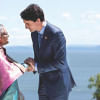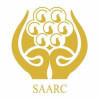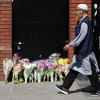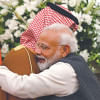Terrorists in Bangladesh
LOCALS and foreigners in Dhaka formally grieved for the victims of the Gulshan Attack one month after the incident. The local and international reaction to the July 1 terror attack at Gulshan has been far more intensive than the collective reaction to all the previous terror attacks in Bangladesh since 1999; there had never been any such mass grieving for terrorism-victims previously.
Now, why was the Gulshan café attack so significant? Because, it was for the first time, terrorists attacked the heart of the elite enclave and diplomatic zone in Bangladesh, killing 17 foreigners and three well-to-do Bangladeshis. Most importantly, rich, secular-educated urban terrorists killed the foreigners exclusively because of their ethno-national and religious identities; and the three Bangladeshis from well-to-do families for reasons best known to them. At the end of the day, who the terrorists are matters, but who the victims are, matters also.
In the backdrop of fear, conspiracy theories, and singling out private universities as "new madrasas", Bangladeshi politicians, analysts, and intellectuals are surprised, secular-educated, rich urban youths, not poor, madrasa-educated students took part in the Gulshan attack. Their surprise reflects their lack of familiarity about Islamist terrorist outfits in the world, overwhelmingly led and manned by upper class, Muslim technocrats. The perception, that only devout mosque-attending Muslims, and madrasa-educated people are Islamist terrorists is balderdash.
Terrorist outfits like al Qaeda, Islamic State, HUJI, and JMB didn't emerge out of mosques and madrasas. Only Afghan and Pakistani Taliban, and the fierce Lashkar-e-Taiba in Pakistan are exceptions in this regard. The US-sponsored "jihad" for Afghanistan, and the Pakistan-sponsored "jihad" for Kashmir, and their promotion of Islamist extremism through mosques and madrasas turned these places into the epicentres of Islamist terrorism. Madrasas teach Islamic rituals, fatalism and next-worldliness; and demonise democracy, modernism, secularism, women's liberation and equal rights; but there's no evidence madrasas initiated their students into terrorism.
Faction-ridden Muslim clerics in Bangladesh often vilify each other as deviant, and even as promoters of terrorism. Recently, Maulana Fariduddin Maswood – the imam of the Sholakia Eidgah and the Chief of the Bangladesh Jamiat-ul-Ulama – publicly stated in Dhaka that books prescribed by the Bangladesh Madrasa Board promoted Islamist extremism. To him, the Education Minister's alleged oversight virtually amounted to promoting jihad in Bangladesh.
As the ongoing Arabisation-cum-Wahhabisation process has alienated people from secularism and democracy, so have massive corruption and impunity of the rich and powerful estranged many from the state of Bangladesh. Illegitimate rulers like General Ershad were mainly responsible for legitimising political Islam in Bangladesh. Islamist extremism is just the other side of the coin. If the state retains Islam as the "state religion", at the end of the day, one can't really blame Muslim youths for taking up arms to establish "true Islam" or Sharia, for peace, order, and a corruption-free society!
What retired basketball player Kareem Abdul-Jabbar thinks about Islam and terrorism is very interesting: "ISIS represents Islam like the KKK represents Christianity". Although terrorism has nothing to do with Islam, terrorist leaders are so good at invoking and exploiting Islam that not only their followers but terrorism experts also start believing that al Qaeda and ISIS et al are primarily Islam-oriented terrorist outfits. Hence, the quest for the "violent aspect" of Islam! Imputing Islamist terror attacks to Islam is like blaming certain types of fertiliser, which terrorists use to make bombs to blow up buildings.
I could cite dozens of Quranic verses, including the so-called "violent verses", to illustrate the negative correlation of Islam and terrorism. The following Quranic verses dispel some of the myths about Islam's alleged support for discriminations against non-Muslims, and unjust wars and terrorism:
a) "Surely among Muslims, Jews, Christians and Sabians, whoever believes in God and the Last Day, and whoever does right, shall have his reward with his Lord and will neither have fear nor regret" (2:62);
b) "Permission is granted to those [non-Muslims] to take up arms who were oppressed….And if God has not restrained some men through some others, monasteries, churches, synagogues and mosques, where the name of God is honoured most, would have been razed" (22:39-40).
c) "Fight those in the name of God who fight you, but do not be aggressive; God does not like aggressors" (2: 190).
d) "…Whoever kills a soul unless for a soul or for corruption [done] in the land – it is as if he has killed the entire human race. And whoever saves one soul – it is as if he has saved the entire mankind" [5:32].
Now, we need convincing answers to the question: Why have urban rich kids, not poor students, swelled the ranks of ISIS in Bangladesh? The Prime Minister's Information Advisor Iqbal Sobhan Chowdhury candidly admitted the government and experts had simply failed to understand the problem by only finger pointing at mosques and madrasas as the promoters of terrorism in Bangladesh. Author and computer science professor Zafar Iqbal has also raised the same question. He has also narrated an episode in his column in a Bengali daily (Kaler Kantha, July 28) about pro-Government students' "extortion business" at his University. This episode being a microcosmic representation of Bangladesh provides part of the answer to his question too.
Bangladesh is virtually a safe haven for corrupt people. A section of politicians, government servants, businessmen, industrialists, bankers, professionals, labour/youth/student-leaders seem to be busy making money right and left, through extortions, bribes, and plundering in the public and private sectors. The growing youth bulge – more than 40 percent of the population is in the18 to 39-year-old age group – and the widening gap between the rich and poor, with massive 45 percent unemployment among educated youths, Bangladesh has a potential of being a fertile breeding ground for terrorism and anarchy. According to UNICEF, 7.4 million children aged between five and 17 are working as domestic servants, agricultural and factory labourers in Bangladesh. These statistics are very discomforting.
Instead of addressing the problems of governance, poverty, and mass alienation of people from society, the Government is trying to "reform" Islam as a counterpoise to terrorism. Although there is no positive correlation between terrorism and mosque-madrasa establishments, yet the government has started preparing a standardised Khutba or Friday prayer sermon through the Islamic Foundation for all mosques in Bangladesh to prevent the spread of any terrorist ideas through unapproved sermons. The Government has already spent Tk. 260 million on this project.
Since terrorism is a political not an Islamic problem, promoting any "de-contaminated" Islam would change nothing. We need to understand what the terrorists want to reform, before trying to reform them. But first of all we need transparent and accountable governance with equal opportunity for all. Historically, poverty-stricken classes never staged any revolutionary or terrorist movement anywhere in the world. The poor, marginalised, and uninformed madrasa students in Bangladesh are too weak and disorganised to spearhead any violent or revolutionary movement. This explains why urban, rich, and secular-educated – not rural, poor, and madrasa-educated – youths appear so far to be the main foot soldiers of Islamist terror in Bangladesh.
The writer teaches Security Studies at Austin Peay State University in the US. He is the author of several books, including his latest, Global Jihad and America: The Hundred-Year War Beyond Iraq and Afghanistan (Sage, 2014).
Email: [email protected]

 For all latest news, follow The Daily Star's Google News channel.
For all latest news, follow The Daily Star's Google News channel. 







Comments